- City Fajr Shuruq Duhr Asr Magrib Isha
- Dubai 04:31 05:49 12:21 15:48 18:47 20:05

File - This is a June 19, 1987 file photo of David Bowie. Bowie, the other-worldly musician who broke pop and rock boundaries with his creative musicianship, nonconformity, striking visuals and a genre-bending persona he christened Ziggy Stardust, died of cancer Sunday Jan. 10, 2016. He was 69 and had just released a new album. (AP)
David Bowie had his greatest screen role in Thomas Jerome Newton, the brilliant, tormented alien hero of Nicolas Roeg's 1976 adaptation of Walter Tevis' novel 'The Man Who Fell to Earth.'
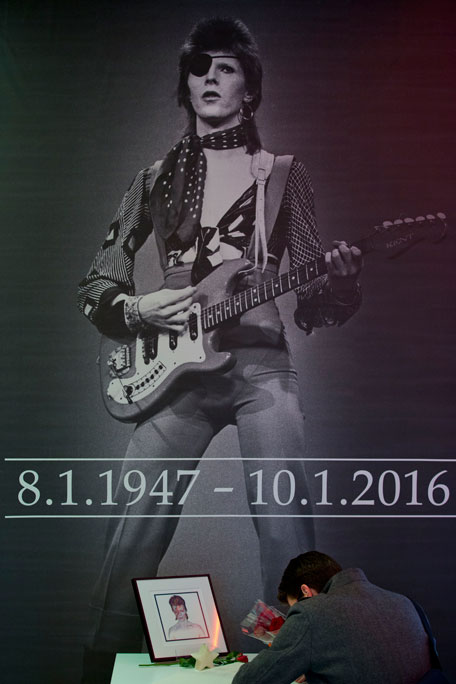
A man sign a book of condolences next to a picture of popstar David Bowie at the Groninger Museum which hosts the 'DAVID BOWIE is' exhibit, in Groningen, northern Netherlands, Monday, Jan. 11, 2016. AP
The epigraph of Tevis' 1963 book is drawn from a poem by Hart Crane that not only captures Newton's tragic earthbound fate, but also the splendid otherness of the musician-actor himself who died Sunday at 69.
And so I entered the broken world To trace the visionary company of love, its voice An instant in the wind (I know not whither hurled), But not for long to hold each desperate choice
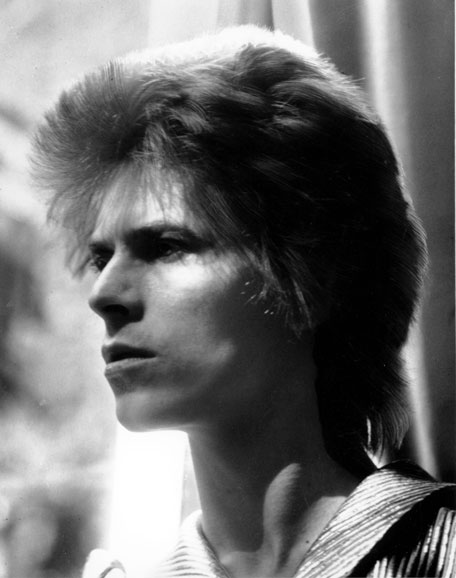
AP
For many, Bowie first materialized, out of the airless landscape of his song, in 'Space Oddity,' a track from his 1969 sophomore album, variously titled "David Bowie" and "Man of Worlds/Man of Music." Only belatedly a hit in the U.S., it gave us the measure of Bowie's artistic persona as surely as Roeg's cinematic science fiction, in the figure of Major Tom, an astronaut adrift in the cosmos, far from the blue marble of Earth and its love.
Not satisfied by merely writing about life in space, Bowie swiftly sought to replicate it on stage with the formation of the outre band the Spiders From Mars. The group had a difficult, protracted birth, as many other acts in rock's vanguard did over time, and it was not until 1972 - in the wake of his musical statement of purpose 'Changes' - that the singer-songwriter assumed his altered ego 'Ziggy Stardust.'

Even amid the ferment of Britain's glam revolt of the early '70s, which produced such acts as Roxy Music and Marc Bolan's T. Rex, Bowie stood apart. Clad in shimmering silver mylar, looming in towering platform shoes, his head topped with a high-voltage shock of crimson hair, he looked at the musical culture of the time through his startling mismatched eyes and saw it as an ocean of possibility in which to create a gigantic whirlpool.
Between 1972 and 1974 he fabricated a trio of startling, hard-rocking albums: 'The Rise and Fall of Ziggy Stardust' and the 'Spiders From Mars,' 'Aladdin Sane' and 'Diamond Dogs.'

While only the latter became a major stateside hit (it peaked at No. 5), this trilogy, with its coruscating tracks 'Five Years,' 'Moonage Daydream,' 'Rock 'n' Roll Suicide,' 'The Jean Genie,' 'Panic in Detroit,' 'Diamond Dogs' and 'Rebel Rebel,' offered up a new vision of pleasure, pansexuality and fear on the brink of Apocalypse.
He left his formidable, boundary-pushing imprint on the work of others during this period, producing Lou Reed's image-altering "Transformer," writing and producing the glam anthem "All the Young Dudes" for Mott the Hoople and producing Iggy and the Stooges' screaming proto-punk magnum opus 'Raw Power.'
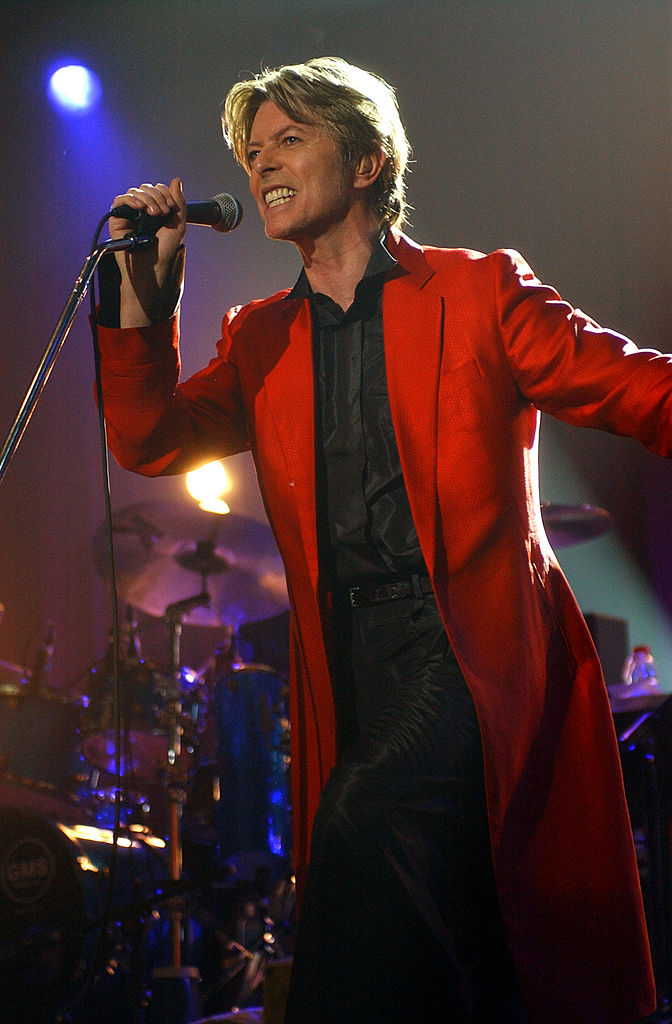
Reuters
Many young fans embraced Bowie's concepts and his look with the glee of true believers, donning mad rags and decorating their faces with showers of glitter and painted lightning bolts in emulation of their hero. Even those who declined to embrace the glitter lifestyle -- which Bowie and his Spiders lived out on stage in their hyper-theatrical shows - had to admit that nothing quite like him had walked among us before.
By 1975, Bowie realized that Ziggy had said all he had to say. Besides, what better course for an alien than to mutate? And so he bowed a more dance-oriented sound with the funk-inflected, Philadelphia-bred 'Young Americans' and the chillier, more reserved 'Station to Station,' in which he assumed the mantle of the Thin White Duke - Thomas Jerome Newton made flesh, before a stack of amplifiers.
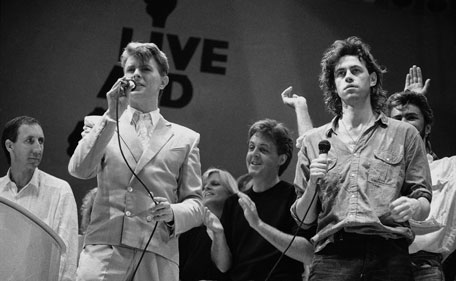
File - This is a Saturday, July 13, 1985 file photo of David Bowie, front left, and Bob Geldof, right right, at the end of the London part of the Live Aid famine relief concert at Wembley Stadium in London. AP
Now the embodiment of the rock star in both image and lifestyle, Bowie came as close to succumbing to drug abuse as Newton does to alcoholism in 'The Man Who Fell to Earth.' With space not an option, the musician chose exile, and moved to West Berlin in 1976. It was an ideal locale, for the lessons of such German precursors as Can, Kraftwerk and Neu! had not fallen on deaf ears.
In the company of collaborators Brian Eno, late of Roxy Music, and guitarist Robert Fripp of King Crimson, he made a second striking trio of albums: 'Low,' 'Heroes' and 'Lodger.'
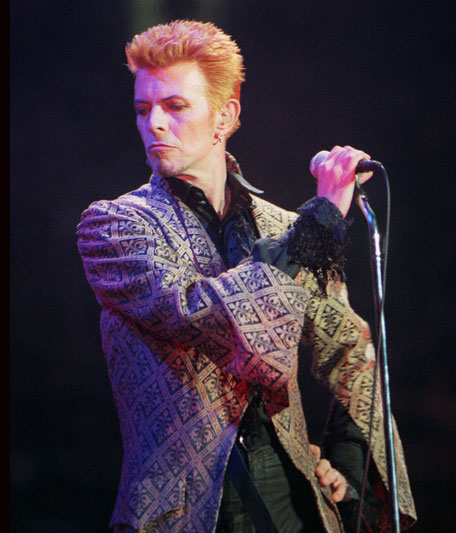
File - In this Jan. 9, 1997, file photo, David Bowie performs during a concert celebrating his 50th birthday, at Madison Square Garden in New York. AP
Rich in texture, cool to the touch but underpinned by insistent, passionate rhythm, they put a wholly personalized stamp on the mechanized electronic music that had preceded it. Bowie also brought the sound to 'The Idiot,' the debut solo album by his Berlin roommate, Iggy Pop of the Stooges.
Following his sojourn in Berlin, Bowie returned to space and to Major Tom, now a junkie, on 'Ashes to Ashes,' a track from his 1980 album 'Scary Monsters.'
But his career for many years would become disappointingly down to earth.
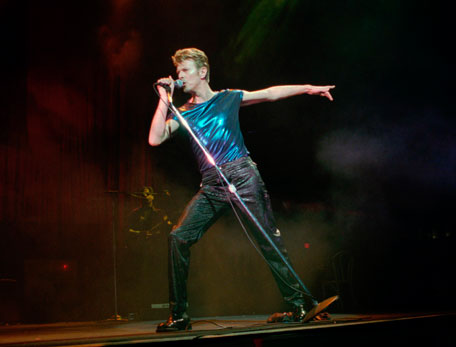
File - In this Sept. 14, 1995, file photo, David Bowie performs in Hartford, Conn. AP
His 1983 funk opus 'Let's Dance,' a collaboration with Chic's Nile Rodgers, spawned his second and final No. 1 single. In the twinkling of an eye, he was camping it up with Mick Jagger in a remake of 'Dancing in the Streets' that made even some hardcore fans grimace.
He lived for some time in a bizarre artistic and commercial netherworld, restless, never standing still, but also never capturing the ears and hearts of listeners as he had before.
He put aside solo work for two albums with what was, for him, a conventional rock band, Tin Machine.
He toyed with electronica and industrial music on the albums 'Black Tie White Noise' and 'Outside.'
He wrote the soundtrack for a computer game. He starred as a delightfully menacing Goblin King in what was to become a beloved fantasy film, 1986's 'Labyrinth,' directed by Muppets master Jim Henson.
Like a character in a William Gibson novel, Bowie again went off the grid, appearing only sporadically on stage and film for a decade. During that time he turned in one of his most effective movie performances, fittingly, as gnomic visionary Nikola Tesla in Christopher Nolan's 2006 feature 'The Prestige.'
But he made a striking return to the studio in 2013 with 'The Next Day,' a vital work that rose to No. 2, his highest-charting U.S. album.
He saved his best for last: 'Blackstar,' his final album, recorded as his illness deepened, saw release this past Friday, his last birthday. Jazzy, urgent and deeply felt, at times reminiscent of his contemporary Scott Walker's most experimental records, it was prefaced by a stunning single and video, 'Lazarus.'
It can only be seen now as a remarkable self-composed epitaph, a finale on an astral plane. In the clip, Bowie writhes on a hospital bed, his eyes swathed in bandages.
He directs the listener, 'Look up here, I'm in Heaven,' and continues as the music rises in intensity:
Oh, I'll be free just like that bluebird Oh, I'll be free Ain't that just like me
Free, as ever. Otherworldly, to the end.
![]() Follow Emirates 24|7 on Google News.
Follow Emirates 24|7 on Google News.